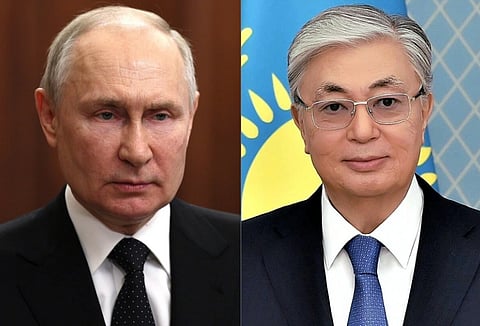
- Union Budget 2026
- Home
- NewsGram USA
- India
- न्यूजग्राम
- World
- Politics
- Entertainment
- Culture
- Lifestyle
- Economy
- Sports
- Sp. Coverage
- Misc.
- NewsGram Exclusive
- Jobs / Internships

This article was originally published in Radio Free Europe/Radio Liberty (RFE/RL) . Read the original article.
By Reid Standish
Following a high-profile summit in Washington with all five Central Asian leaders that saw new US deals worth billions of dollars, Kazakh President Qasym-Zhomart Toqaev arrived in Moscow to reaffirm ties with Russian President Vladimir Putin and chart Russia’s future economic role in the Central Asian country.
Toqaev arrived on November 11 for a one-on-one discussion with Putin and is holding formal talks on November 12 to discuss joint gas projects and the economic fallout from US sanctions on Russia’s major oil companies. The Kazakh president is also set to address a Kazakh-Russian economic forum.
See Also: Trump and Zelenskyy to Meet in Washington for Ukraine–Russia Peace Talks
The timing of the meeting in Moscow isn’t coincidental, experts told RFE/RL, with it being seen as the latest step in Kazakhstan’s long-standing and carefully calibrated diplomatic balancing act between Russia, the main outside power in Central Asia, China, which has grown increasingly influential over the last decade, and Western powers like the United States looking to deepen their footprint in the region.
“Following the [US-Central Asia] summit, the visit to Moscow can be seen as a reaffirmation of Kazakhstan’s strategic ties with Russia and an effort to ease any concerns within the Russian political elite,” Yunis Sharifli, a nonresident fellow at the China Global South Project, told RFE/RL.
Alongside the four other Central Asian presidents in Washington last week, Toqaev held talks with US President Donald Trump and heralded the “beginning of a new era of interaction between the United States and Central Asia.”
Russia’s full-scale invasion of Ukraine and the subsequent Western sanctions on Moscow have opened up new economic opportunities for Central Asia that has left the Kremlin looking to adapt.
“[Russia] is attempting to restructure and redefine its role in the region,” Sharifli said. “Moscow continues to play a critical role as a security provider, leveraging its long-standing military and security ties with regional governments.”
Kremlin spokesman Dmitry Peskov told reporters that Putin is open to hear more about Toqaev’s bilateral and joint meetings with Trump in Washington and said that Astana and Moscow’s energy ties would be discussed between the two leaders.
“If the president of Kazakhstan considers it necessary to inform our president about the content of the contacts he had in Washington, of course that will be extremely interesting for the Russian side,” Peskov said.
LUKoil and Rosneft, two Russian oil giants that were hit by US sanctions in October, have large holdings in Kazakhstan, which exports most of its oil through Russia to other markets. LUKoil also holds stakes in Kazakhstan’s massive Tengiz and Karachaganak fields, which are operated by Western oil giants.
Ahead of his arrival in Moscow, Toqaev looked to play up Russia’s warm ties with Kazakhstan and the country’s standing on the global stage.
In an article published in the Russian state-owned newspaper Rossiyskaya Gazeta, he praised Astana’s “eternal friendship” with Moscow and described Kazakhstan’s relationship with Russia as a “comprehensive strategic partnership and alliance.”
Toqaev also mentioned recent high-level talks that he held with Chinese leader Xi Jinping, Trump, and other European, Asian, and African presidents.
“Although many of them are at opposite ends of the geopolitical spectrum, they all recognize the exceptional role of Russia and its leader in resolving key issues in international relations,” Toqaev said. “In other words, it is impossible to overcome the contradictions of the modern world without Moscow’s participation.”
Vlad Paddack, a fellow at Nightingale Intelligence, a political foresight firm, told RFE/RL that the diplomacy in Moscow on the heels of the summit in Washington “showcases Kazakhstan’s ascendance as a middle power, adept at balancing major powers while reinforcing its regional leadership.”
Beyond sanctions and energy ties, Toqaev also discussed infrastructure during his talks with Putin.
While summits this year between Central Asian leaders and the United States and the European Union have focused on building up the Middle Corridor, a roughly 6,500-kilometers trade route that connects China to Europe through Central Asia and the Caucasus by bypassing Russia, Moscow is looking to open up trade access to South Asia by transiting through Kazakhstan and its neighbors.
Paddack says this reflects Kazakhstan’s “ambition to serve as Eurasia’s primary logistics hub” and position itself at the heart of all regional trade.
Copyright (c)2025 RFE/RL, Inc. Used with the permission of Radio Free Europe/Radio Liberty
[VS]
Suggested Reading:
